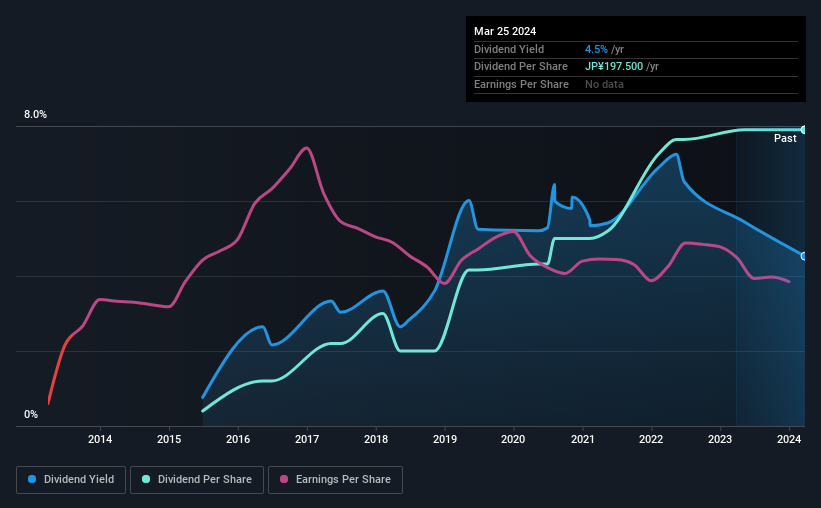
Asanuma Corporation (TSE:1852) has announced that it will be increasing its dividend from last year's comparable payment on the 26th of June to ¥197.50. This will take the annual payment to 4.5% of the stock price, which is above what most companies in the industry pay.
Check out our latest analysis for Asanuma
Asanuma Is Paying Out More Than It Is Earning
A big dividend yield for a few years doesn't mean much if it can't be sustained. Before making this announcement, the company's dividend was much higher than its earnings. This situation certainly isn't ideal, and could place significant strain on the balance sheet if it continues.
Earnings per share could rise by 0.8% over the next year if things go the same way as they have for the last few years. However, if the dividend continues along recent trends, it could start putting pressure on the balance sheet with the payout ratio reaching 135% over the next year.

Asanuma's Dividend Has Lacked Consistency
Looking back, Asanuma's dividend hasn't been particularly consistent. Due to this, we are a little bit cautious about the dividend consistency over a full economic cycle. Since 2015, the annual payment back then was ¥10.00, compared to the most recent full-year payment of ¥197.50. This implies that the company grew its distributions at a yearly rate of about 39% over that duration. Despite the rapid growth in the dividend over the past number of years, we have seen the payments go down the past as well, so that makes us cautious.
The Dividend's Growth Prospects Are Limited
With a relatively unstable dividend, it's even more important to evaluate if earnings per share is growing, which could point to a growing dividend in the future. Unfortunately, Asanuma's earnings per share has been essentially flat over the past five years, which means the dividend may not be increased each year. The company is paying out a lot of its profits, even though it is growing those profits pretty slowly. As they say in finance, 'past performance is not indicative of future performance', but we are not confident a company with limited earnings growth and a high payout ratio will be a star dividend-payer over the next decade.
Asanuma's Dividend Doesn't Look Sustainable
Overall, we always like to see the dividend being raised, but we don't think Asanuma will make a great income stock. The track record isn't great, and the payments are a bit high to be considered sustainable. Overall, we don't think this company has the makings of a good income stock.
Companies possessing a stable dividend policy will likely enjoy greater investor interest than those suffering from a more inconsistent approach. However, there are other things to consider for investors when analysing stock performance. Just as an example, we've come across 3 warning signs for Asanuma you should be aware of, and 2 of them are concerning. If you are a dividend investor, you might also want to look at our curated list of high yield dividend stocks.
New: Manage All Your Stock Portfolios in One Place
We've created the ultimate portfolio companion for stock investors, and it's free.
• Connect an unlimited number of Portfolios and see your total in one currency
• Be alerted to new Warning Signs or Risks via email or mobile
• Track the Fair Value of your stocks
Have feedback on this article? Concerned about the content? Get in touch with us directly. Alternatively, email editorial-team (at) simplywallst.com.
This article by Simply Wall St is general in nature. We provide commentary based on historical data and analyst forecasts only using an unbiased methodology and our articles are not intended to be financial advice. It does not constitute a recommendation to buy or sell any stock, and does not take account of your objectives, or your financial situation. We aim to bring you long-term focused analysis driven by fundamental data. Note that our analysis may not factor in the latest price-sensitive company announcements or qualitative material. Simply Wall St has no position in any stocks mentioned.
About TSE:1852
Proven track record with adequate balance sheet and pays a dividend.
Market Insights
Community Narratives



